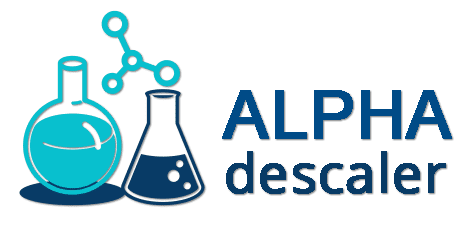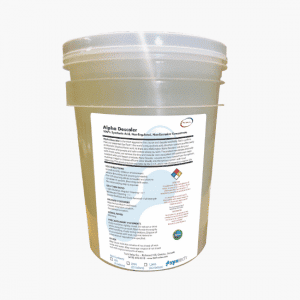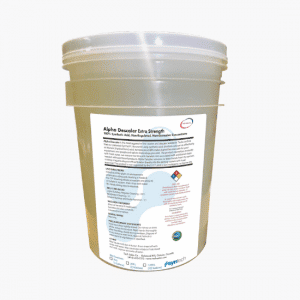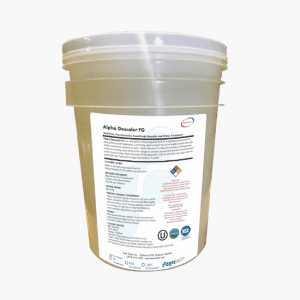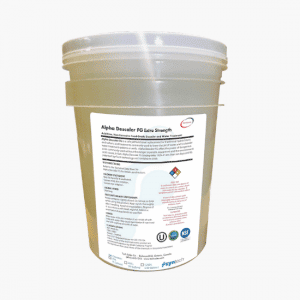Oil & Gas Applications
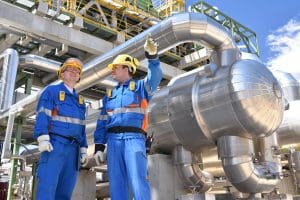 In oil and gas processing systems make extensive use of all types of heat exchangers, condensers and cooling towers. All of these systems are extremely important and need to work at maximum capacity. For example, if the water used in the process is too hot before it goes for treatment in a treatment facility for recycling, it cannot be accepted and the producer can actually be fined. Even a 0.8mm fouling on a condenser/chiller can result in a 30% increase in energy cost! While water treatment can help slow down the buildup of scale and rust deposits, it will still build up over time requiring cleaning.
In oil and gas processing systems make extensive use of all types of heat exchangers, condensers and cooling towers. All of these systems are extremely important and need to work at maximum capacity. For example, if the water used in the process is too hot before it goes for treatment in a treatment facility for recycling, it cannot be accepted and the producer can actually be fined. Even a 0.8mm fouling on a condenser/chiller can result in a 30% increase in energy cost! While water treatment can help slow down the buildup of scale and rust deposits, it will still build up over time requiring cleaning.
Cleaning means downtime and with ever increasing labor costs ever second counts in cleaning during this maintenance period.
The materials used vary from shell and tube heat exchangers made of copper-nickel to plate exchangers, made of stainless steel or titanium. Then you have cooling towers – very large ones used for evaporative cooling. They can have serious issues with scale buildup on the infills and the nozzles that spray the circulated water for the evaporative cooling process.
Refineries have all sorts of equipment – boilers, cooling towers, heat exchangers of all types that require descaling even if water treatment is used.
One product used in refineries for water filtration is an anthracite filter. These filters can be quite large in refineries. Over time these filters need to be descaled as the scale buildup occurs from the filtration process. In the past, the anthracite was usually removed and the filter housing cleaned, and the anthracite returned or replaced which is time consuming and costly. Some locations use inhibited Hcl solutions and other chemistries which most likely will not negatively affect the anthracite but could have a long term corrosive effect of the housing depending on the material. A significant volume of cleaning solution is needed on large filters so fuming can be an issue with traditional inorganic acids such as HCl or phosphoric and others.
In offshore drilling platforms, scale removal is a challenge because it is offshore. Multiple heat exchangers on rigs require the use of fast acting and certainly the safest descalers. Even traditional inhibited hydrochloric acid (Hcl) based products, still used can negatively affect a system and raise safety concerns. Avoiding damage to system components is extremely important because of the high costs for repair on offshore platforms. Despite claims of safety for Hcl based products, that they tend to be is actually about 10% Hcl with inhibitors and does not significantly enhance safety.
The personal safety of rig personnel should be paramount. Any product claiming such safety to personnel should clearly state LD50 toxicity on their safety data sheets. Hydrochloric acid, even inhibited is corrosive to the eyes, skin, and mucous membranes, especially when in use because of the fumes generated. There are not a great deal of places to hide on an off-shore platform.
Scale forms in SSSVs in wells and master, wing and choke valves, flow lines, as well as other water systems, separators, flair drums, and hydrocyclones.
Hcl is not biodegradable.
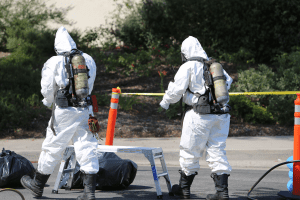 Hydrochloric acid will likely be neutralized to chloride by the alkalinity present in the natural environment but on its own is simply not biodegradable. Claim to biodegradability are usually made with heavily diluted material or assumptions that the product is relatively neutralized after use. So disposal of spent solution of an HCl based product can usually only be with fully neutralized solution from an off shore platform.
Hydrochloric acid will likely be neutralized to chloride by the alkalinity present in the natural environment but on its own is simply not biodegradable. Claim to biodegradability are usually made with heavily diluted material or assumptions that the product is relatively neutralized after use. So disposal of spent solution of an HCl based product can usually only be with fully neutralized solution from an off shore platform.
Alpha Descaler and Alpha Descaler FG, in the standard versions and extra strength versions have no chlorides and literally tested on steel to be non-corrosive. These products are shipped a safe, non-hazardous products. They are organic and 100% biodegradable in 10 days, even as it comes full strength. All products are marine safe! – an ideal situation for the offshore drilling platform applications.
Their LD50 toxicity levels are clearly shown on the Safety Date Sheets for each product to show that they are non-toxic. Corrosion tests compared against some common HCl based descalers claiming non-corrosivity and non-toxicity indicate all the Alpha Descaler versions to have the lowest corrosion rates on all common metals used in heat exchangers and found in the equipment used in oil and gas production.
Downtime is Key in the Oil and Gas Industry.
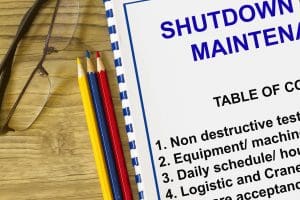 Time is money in this industry. A problem with inorganic descalers such as HCl , inhibited or otherwise is that they start out fast and slow down as they get weaker during the descaling process. This slows down the descaling process because of excess cavitation in the system as it’s circulated, preventing the solutions from contacting the scale surface to remove it. And of course you have potentially toxic fumes to also deal with. A product with low fuming is a significant advantage for cleaning and for safety.
Time is money in this industry. A problem with inorganic descalers such as HCl , inhibited or otherwise is that they start out fast and slow down as they get weaker during the descaling process. This slows down the descaling process because of excess cavitation in the system as it’s circulated, preventing the solutions from contacting the scale surface to remove it. And of course you have potentially toxic fumes to also deal with. A product with low fuming is a significant advantage for cleaning and for safety.
All Alpha Descaler versions are essentially non-fuming to address the safety issue as well as the product being truly non-toxic. The foaming action is very low which makes the chemical contact significantly more efficient for removing the scale buildup. This makes the cleaning process much more efficient. All Alpha Descaler versions dissolve the scale buildup at the same rate throughout the process. All the same scale that Hcl can remove, will be removed by all versions of Alpha Descaler. As mentioned earlier, most inhibited Hcl based descalers that claim safety is usually at a concentration of approximately 10%. Regular Alpha Descaler and Alpha Descaler FG can remove the equivalanet to what a 10% Hcl solution can achieve. However, Alpha Descaler FG Extra Strength and Alpha Descaler Extra Strength has the scale removal power of 30% Hcl. That is a tremendous advantage especially on off shore platforms. And the extra strength versions still have significantly lower corrosion rates on all materials compared to traditional acids and will not negatively affect gaskets and seals in a water system.
Rust Removal in Heat Exchangers is Important.
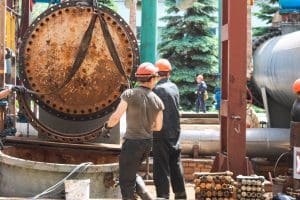 Rust buildup in water systems is a problem as the rust spots become a breeding ground for algae. For offshore platforms the corrosiveness of seawater can create rust spots, especially in plate exchangers which are usually made of stainless steel. Normally, any descaler used will also kill any algae which can then be washed out and that includes the Alpha Descaler products. But all versions of Alpha Descaler, especially the extra strength versions have been proven to be excellent rust removers. So removing the scale will also remove the rust. If rust is a big concern, we always recommend the extra strength versions. This also helps to better destroy any algae buildup which can then be washed out, during the cleaning circulation process.
Rust buildup in water systems is a problem as the rust spots become a breeding ground for algae. For offshore platforms the corrosiveness of seawater can create rust spots, especially in plate exchangers which are usually made of stainless steel. Normally, any descaler used will also kill any algae which can then be washed out and that includes the Alpha Descaler products. But all versions of Alpha Descaler, especially the extra strength versions have been proven to be excellent rust removers. So removing the scale will also remove the rust. If rust is a big concern, we always recommend the extra strength versions. This also helps to better destroy any algae buildup which can then be washed out, during the cleaning circulation process.
Hcl based products with around 10% hydrochloric may not be enough to remove the rust completely.
Alpha Descaler FG Extra Strength has actually been used for rust removal on rusted surfaces such as galvanized grating at refineries. It is just applied and left to soak on the rusted surfaces for ten minutes and then washed off along with the rust using a pressure wash with little or no effect on the galvanized portion.
ALL PRODUCTS
-

Alpha Descaler
$175.00 USD – $1,485.00 USD Select options This product has multiple variants. The options may be chosen on the product page -

Alpha Descaler Extra Strength
$250.00 USD – $2,420.00 USD Select options This product has multiple variants. The options may be chosen on the product page -

Alpha Descaler FG
$160.00 USD – $1,210.00 USD Select options This product has multiple variants. The options may be chosen on the product page -

Alpha Descaler FG Extra Strength
$210.00 USD – $1,650.00 USD Select options This product has multiple variants. The options may be chosen on the product page
If you need consulting beyond the scope of a complementary sales inquiry, please contact us by email.
